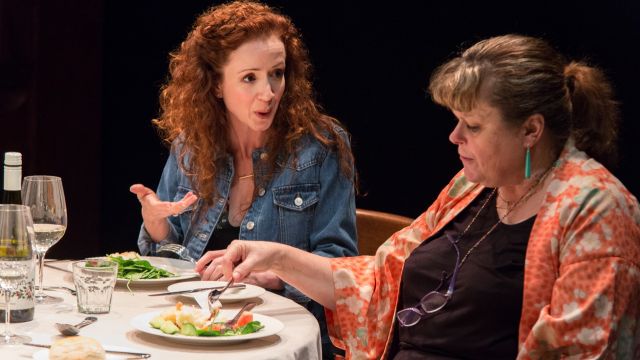Tribes
This is another theatrical ‘scoop’ for the Ensemble. It’s a formidable piece of writing that demands robust direction and dynamic performances. Director Susanna Dowling and her cast have achieved both.
From the first surprising sentence, to the last touching moment, this production is gutsy and passionate, the characters unaffectedly authentic and brutally honest, the direction tight and the pace immaculately controlled.
Playwright Nina Raine has a raft of awards from around the world for her plays. Her writing, is strong, raw, punchy. She has important messages to convey and she does so powerfully through characters that are vociferously real, stunningly complex.
Ana Maria Belo comes to the Ensemble stage playing Sylvia, who is gradually losing her hearing, an experience all too real to Belo, who began losing her own hearing when she was fourteen. She brings deep understanding and empathy to the role. As does Luke Watts, who plays Billy. Watts joined the Australian Theatre for the Deaf straight out of high school and went on to be the first deaf actor to play a leading role for Melbourne Theatre Company.
Together they bring Nina Raine’s compelling message about accepting and celebrating diversity to vibrant life.
Belo is bright and totally believable as Sylvia, blending her on-stage talent and experience with her personal appreciation of the character’s situation. Her Sylvia has a vitality that is effervescent, endearing – and a depth that is emotionally expressive and profoundly moving, especially when Sylvia describes just how losing her hearing ‘sounds’.
Billy has been brought up by hearing parents who believed that teaching him to lip read rather than sign would somehow discount his disability and make him feel accepted. Watts shows clearly the feelings of exclusion and isolation this brings. He is overlooked in the noisy, intense, opinion-driven family inter-change, even though he learns much facial expressions and body language.
It is not until he joins a deaf community organisation, where he meets Sylvia, that he realises how much he – and they – have missed out on by not learning, with him, to sign. And his frustration builds until he confronts the family with their ‘disability’ and demands that they accept him for who he really is.
Sean O’Shea plays Billy’s father, Christopher, a dogmatic, intolerant writer who uses language like a whip to humiliate and scorn. There is not much to like about this character, but his totally politically incorrect lines are brilliantly written and O’Shea delivers them with splendid flamboyance. The character he thus creates is cringe-ingly attractive. Relaxed in his intolerance and prejudice, his constant belittling of his wife and children – except Billy – is squirmingly funny.
 Genevieve Lemon plays Beth, his long-suffering wife. It is good to see Lemon in such a meaty, significant role. She is an astute performer who always establishes her characters quickly and efficiently – and in this role she has the opportunity to give more than a cameo performance, one that has significance depth and dimension. Her physical reactions as Billy tries to explain how they have failed him are heart-breakingly real.
Genevieve Lemon plays Beth, his long-suffering wife. It is good to see Lemon in such a meaty, significant role. She is an astute performer who always establishes her characters quickly and efficiently – and in this role she has the opportunity to give more than a cameo performance, one that has significance depth and dimension. Her physical reactions as Billy tries to explain how they have failed him are heart-breakingly real.
Her daughter, Ruth, played by Amber McMahon, suffers the indignities of her father’s constant barbs with restrained, comic nonchalance. McMahon makes the most of this role. She is dismissingly ambivalent towards her mother and her abusive father; lovingly caring with Billy, less tolerant of their brother Daniel. McMahon has an expressive face which she uses effectively to establish the different aspects of this character.
Daniel, a bright young man who suffers the terrible moods swings of mental illness, is played with perceptive understanding and intelligence by Garth Holcombe. He sustains Daniel’s build up to almost total breakdown as he fights his father’s ridicule with tight physical control and stinging rebuttals. The only constancy he sees in his life is his relationship with Billy – and, as Billy becomes more self-assured and independent, we see this confidence slipping into almost total collapse.
Every character in this play has been skilfully conceived and carefully written by an incredibly perceptive and clever playwright. This production finds all that through discerning, insightful direction and sensitive, convincing performances.
Carol Wimmer
Photographer: Clare Hawley
Subscribe to our E-Newsletter, buy our latest print edition or find a Performing Arts book at Book Nook.

